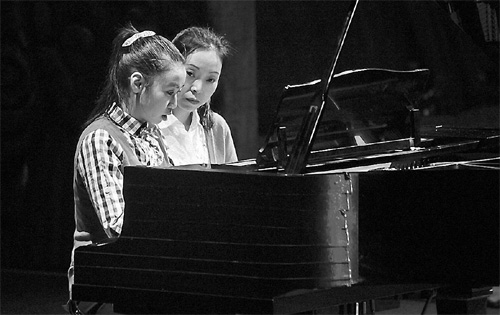Profiles
Solo in the key of Autism
By Huang Zhiling (China Daily)
Updated: 2010-04-15 07:15
 |
Large Medium Small |
Fingers of disabled girl become her connection with outside world
CHENGDU - The heavy rain wasn't going to keep them away.
 Ding Ziyin (left), a 16-year-old girl suff ering from autism, plays the piano with her mother Lan Li sitting by. [China Daily] |
Despite the stormy night, nearly 400 people packed into the Jinsha Theater in Chengdu, capital of Sichuan province, ready for one special performer who was about to capture their imagination.
Meeting Ding Ziyin for the first time, people may think the 16-year-old girl is as healthy, lively and beautiful as her peers.
So not surprisingly, they're taken aback to learn she suffers from autism, a disorder that impairs a person's ability to communicate with others.
But when she sits before a piano that barrier falls away, and the fingers of the young girl - who cannot read music - become her connection with the outside world.
Born into an intellectual's family, Ding could recite over 100 poems from the Tang Dynasty (AD 618-907) at the age of 2. But her mother, Lan Li, discovered something wrong with her daughter after she started kindergarten.
"She was hyperactive and didn't respond when people called her. I thought something was wrong with her hearing and took her to a hospital for a check-up," Lan said.
Ding did not respond when the doctor repeatedly called her name. But she turned to him when he shook a bundle of keys.
Lan heaved a sigh of relief thinking her daughter was simply introverted. But Ding continued acting more and more strangely, scampering about and taking what she liked without permission.
As autism was unknown to the average Chinese in the 1990s, and Chengdu did not have any professionals majoring in the field, it was only when Ding was 5, when her mother took her to Nanjing, capital of Jiangsu province, that she was diagnosed as suffering from autism.
Lan felt her life's dream crumble. But she did not give up. She let Ding stay in kindergarten until she was 8 - two years longer than usual.
Then when Ding was 10, she introduced her to the piano, a decision that would eventually give the girl a new outlet on life.
To keep Ding at the piano, her mom prepared many toys, food and also a ruler.
"I made her know she had to sit down first before she could get what she liked. If she did not sit by the piano, I would threaten her with the ruler," Lan said.
In order to teach Ding how to play the piano, Lan first had to learn how to read music herself, and then she would play along when Ding practiced.
"To Lan's great pleasure, music calmed Ding down. She can sit by the piano for more than two hours. Although she cannot read music, she can memorize what piano teachers teach and can play some 200 piano works," said Tang Lingzi, a senior in the Sichuan Conservatory of Music who taught Ding how to play piano for two years.
She was one of the hundreds who crowded into the theater that night to hear Ding's performance, along with other teachers, doctors and university students.
In 40 minutes, Ding finished 16 pieces such as the modern Chinese works "Defend the Yellow River" and "Butterfly Lovers" as well as Chopin's "Nocturne," Tchaikovsky's "Swan Lake" and Beethoven's "Fur Elise."
The solo performance was held on the evening of April 1 to usher in the third World Autism Day.
"Ding's performance was wonderful for an autism sufferer," Tang told China Daily.
It was a fitting refrain for Ding, who won the gold medal at a piano competition held in Beijing for the handicapped in 2007.
But that was a success that nearly didn't happen.
When it was Ding's turn to play, she did not want to go onstage. She played only after her mother and teacher pushed her to the piano.
"I was worried about how to get Ding to understand the rules of society," Lan said.
At that concert was a dance teacher from Chengdu, Wu Tong, who saw what happened offstage and decided to help Ding.
Returning to Chengdu, Wu tried to make friends with Ding, but at first she did not respond to him at all.
Eventually he kept making motions like he was kicking a ball in front of Ding without talking with her. Seeing his bizarre actions, Ding laughed.
"As she understood me, I thought we could communicate," Wu said.
The two gradually became closer, and thanks to him she can now dance, ride a bicycle and use a skateboard.
Lan told China Daily that holding the solo piano performance was a way to let more people care for children suffering from autism and encourage their parents not to give up hope.
According to the China Disabled Persons Federation, there are some 500,000 people suffering from autism in the country and the number is on the rise.
Shi Wanxiang contributed to the story.
China Daily







